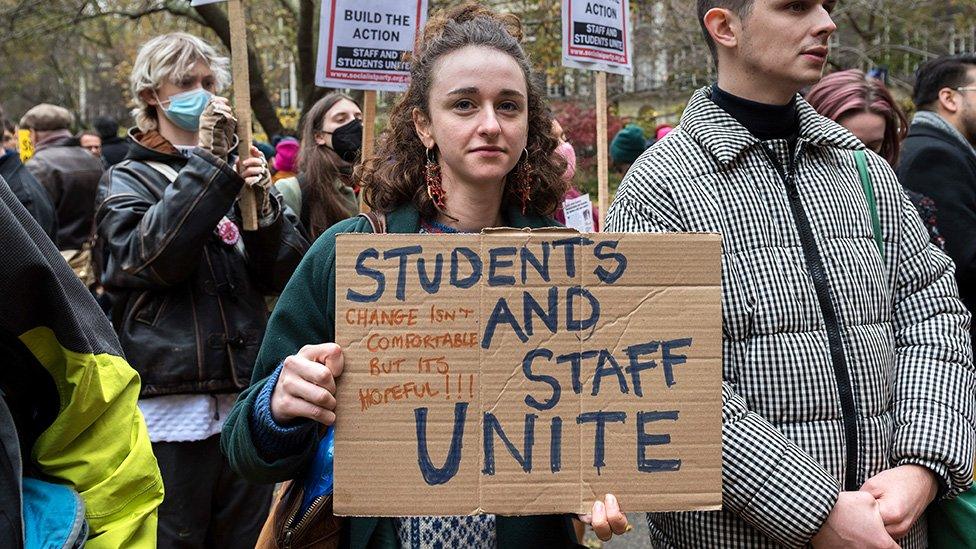University strikes: Students face disruption as walkout begins
- Published
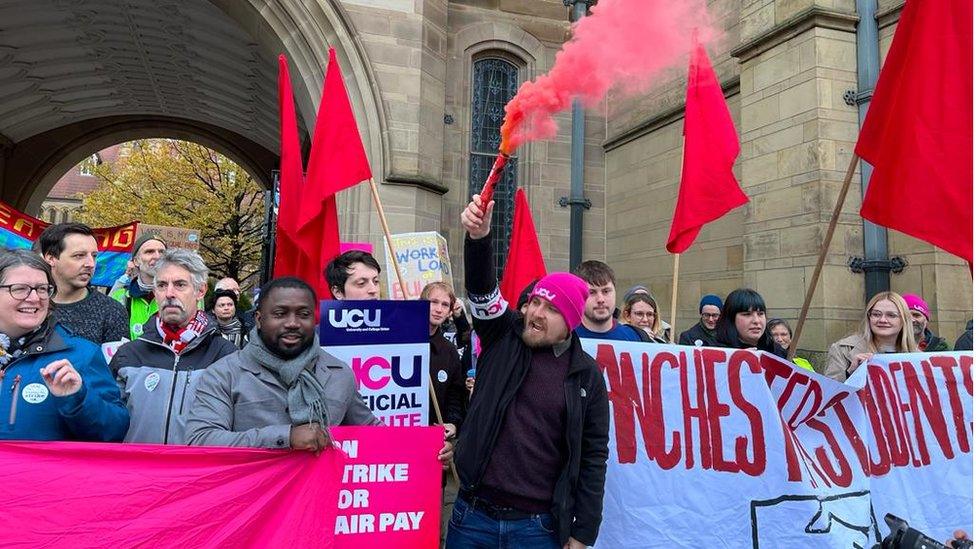
Staff and students at the University of Manchester turned up at 08:00
University staff are walking out on the first of three days of strikes over pay, working conditions and pensions.
Lectures could be called off at 150 affected universities.
The National Union of Students is supporting the strikes, but some students are concerned about missing classes.
The Universities and Colleges Employers Association (UCEA) said the impact of the strikes on students had been "low and isolated".
Universities say they are putting measures in place to mitigate the impact on students' learning.
The University and College Union (UCU) says more than 70,000 staff will be taking part in the strikes, which also take place on Friday and next Wednesday.
It is unclear how much teaching will be called off, as union members do not have to say whether they will be striking.
Master's-degree student Amin Isat, 23, has joined the picket line at the University of Manchester to "show solidarity" with his lecturers.
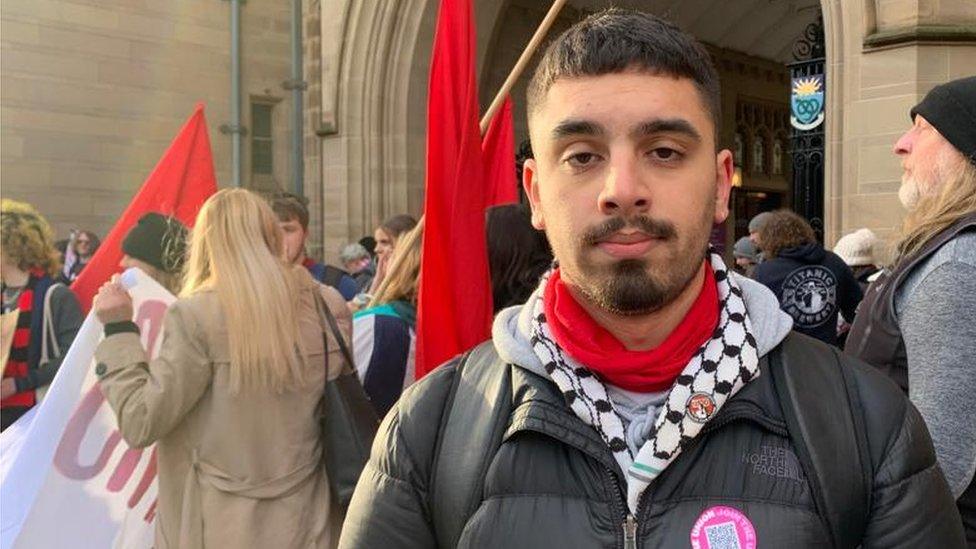
Amin Isat is in the second year of his part-time master's degree in history
"They're being forced into poverty by the university," he said.
"The biggest disruption to our learning is the fact that our teachers and our lecturers aren't able to pay their bills and they're forced to be overworked."
But Billie Early, also a 23-year-old master's-degree student, at the University of Sussex, feels that students are not getting a good "deal" because of the disruption.
Her undergraduate degree was disrupted by strikes and Covid, and now she is missing a seminar on Friday because of this walkout, she said.
"We are paying customers. We're not getting what we paid for," she said.
"For a part-time Masters in a humanity subject, you don't have many contact hours... and then they take that away from you."

Billie Early says her learning has been disrupted most years by strikes and Covid
Ms Early said the strikes bring back a feeling of being "on your own", which she experienced when in-person teaching stopped during Covid.
"I understand why they are striking," she said. "But I just feel that maybe lecturers should reach out to students, and emphasise and reassure us that they do want to be there for us. Because I'm just not get getting that from them."
The University of Sussex said it was "very concerned" about its students, and that measures to "minimise the impact of the strike" included rescheduled teaching and extra materials.
University of Sheffield UCU branch president Dr Robyn Orfitelli, 38, who teaches linguistics, dreamed of being an academic since she was eight but is frustrated by changes in recent years.
"More and more every single year, it feels like we are having to just fight to even be allowed to do our jobs - and people are breaking," she said.
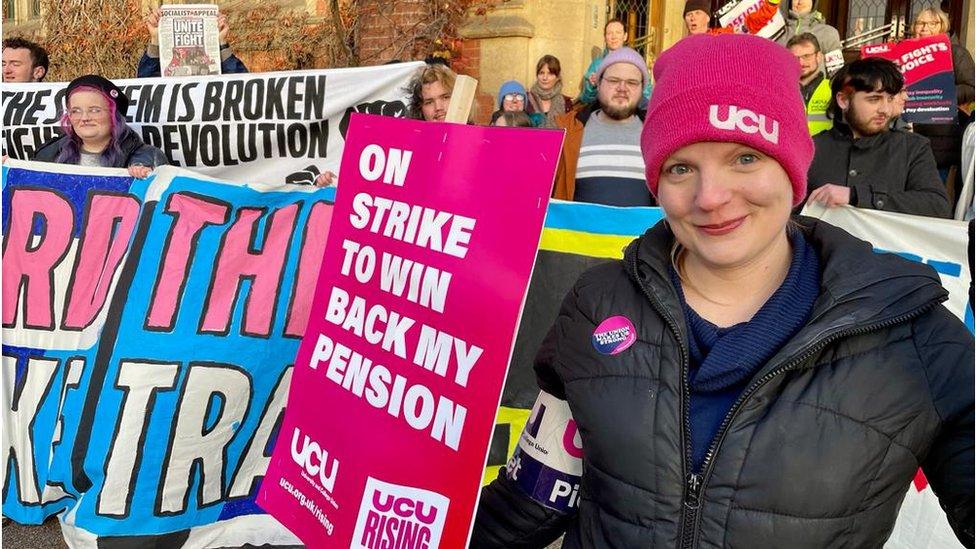
Originally from Alaska, in the US, Dr Robyn Orfitelli is well used to braving the cold and arrived to set up about 07:30
Short-term contracts were pushing "more and more work on to a smaller group of people" on permanent contracts. And her workload meant she struggled to manage research, teaching and pastoral care
"In reality, my day-to-day job involves a lot of emails and doing a lot of paperwork for the university, just to enable me to do all of those other things," she said.
"The disruption that's being caused by us being on strike - this is a drop in the bucket compared to the gradual disruption that's been caused."

'This is for the future of education'
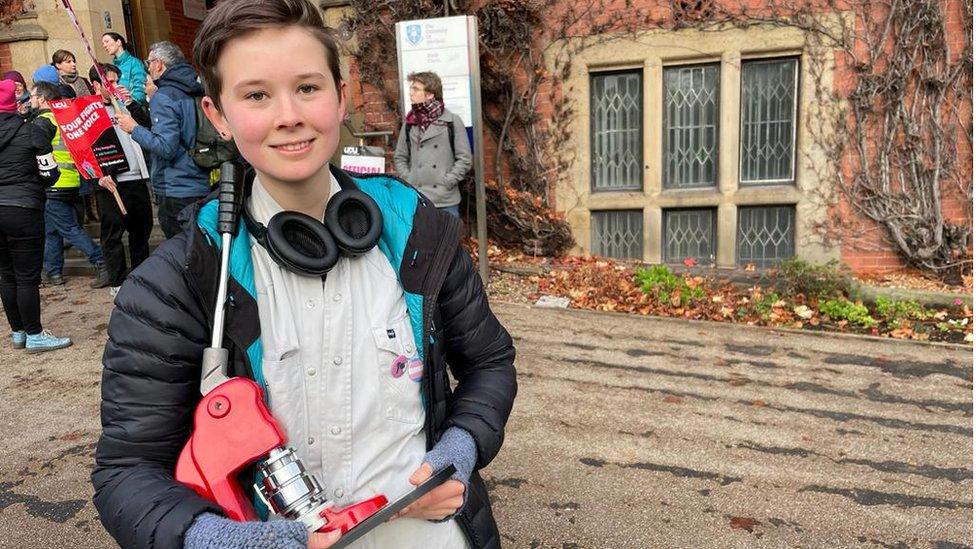
Badges were being made and handed out at the University of Sheffield
By Larissa Tairo, at the University of Sheffield
It's 08:45 at Firth Court, an Edwardian red-brick building at the University of Sheffield.
The pale, yellow sky is breaking through the grey clouds as staff and students gather outside. Some are sporting pink beanie hats. Others have a coffee in one hand and a banner in the other, painted: "Fight for revolution."
Every few minutes, amid chants of "Solidarity," the beep of a passing car lights up their faces.
One student has brought along a machine to make badges for those on the picket line (and says the £80 was worth it).
Lecturers, researchers and student supporters are braving the cold. "I'd rather be teaching than here, freezing," one PhD student says. "But this is for the future of education."

'Even bigger action'
UCU general secretary Jo Grady called it "the biggest strike action in the history of higher education", with the union estimating that 2.5 million students could be affected.
"University staff... have had enough of falling pay, pension cuts and gig-economy working conditions - all whilst vice-chancellors enjoy lottery win salaries," she said.
She said further disruption could be avoided if concerns were "addressed with urgency", and added that, if not, "even bigger action" would follow next year.
The UCU is demanding a pay rise of inflation (RPI) +2%, or 12%, whichever is higher, as well as an end to zero and temporary contracts and action to tackle "excessive workloads".
The dispute over pensions has been rumbling on for more than a decade, and was reignited by what the UCU said was a "flawed" valuation of a pension scheme used by academic staff.
It said the average member "will lose 35% from their guaranteed future retirement income".
Prof Steve West, president of Universities UK and vice-chancellor of UWE Bristol, said the scheme "remains one of the most attractive private pension schemes in the country".
He said students may be worried by further disruption, adding: "Universities are well prepared to mitigate the impact of any industrial action on students' learning, and we are all working hard to put in place a series of measures to ensure this."
Many universities were unable to say what their mitigations would involve when contacted by the BBC, but some stressed that student services and libraries would remain open, and classes would be rescheduled where appropriate.
UCEA chief executive Raj Jethwa said the UCU's pay demand was "unrealistic".
"Strike action does not create new money for the sector," he added.
Chloe Field, vice-president for higher education at the National Union of Students, said it was supporting the strikes because "staff working conditions are students' learning conditions".
Higher education minister Robert Halfon said it was "hugely disappointing" that students would face further disruption, and urged "all sides to work together".

Are you taking part in the strikes? Are you a student who is affected by the industrial action? Email: haveyoursay@bbc.co.uk, external.
Please include a contact number if you are willing to speak to a BBC journalist. You can also get in touch in the following ways:
WhatsApp: +44 7756 165803, external
Tweet: @BBC_HaveYourSay, external
Or fill out the form below
Please read our terms & conditions and privacy policy
If you are reading this page and can't see the form you can email us at HaveYourSay@bbc.co.uk, external. Please include your name, age and location with any submission.
- Published20 October 2023
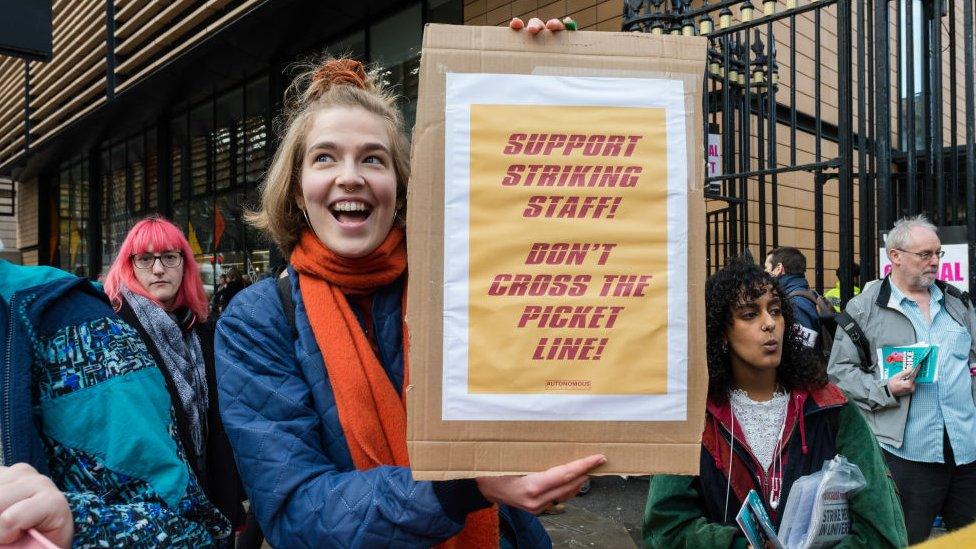
- Published8 November 2022
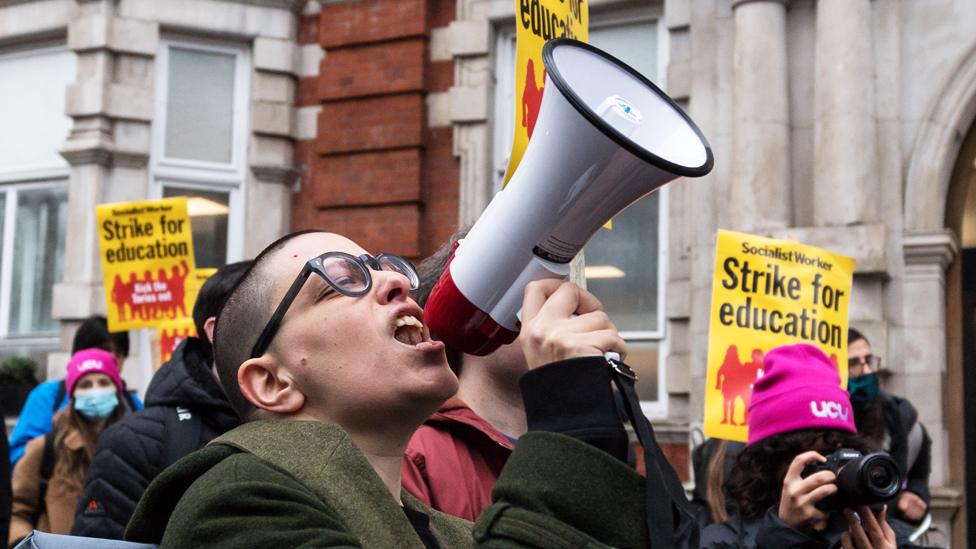
- Published24 October 2022
